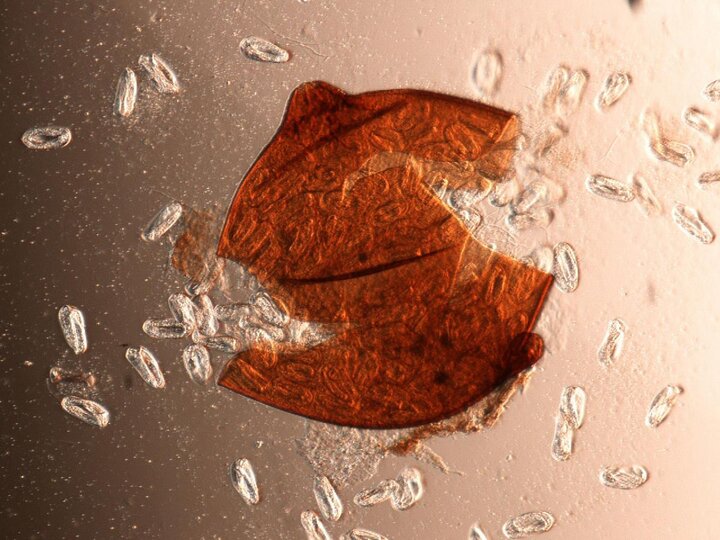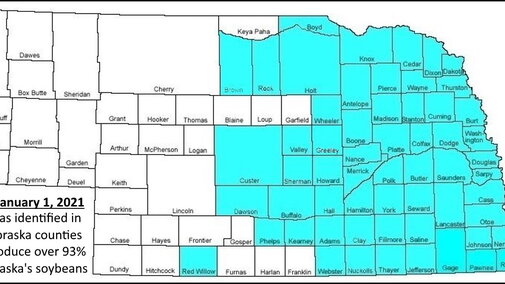For the past 15 years, the Nebraska Soybean Board has provided funded a free soybean cyst nematode sampling program for Nebraska farmers (normally a $25/sample expense). Since 2005, we have processed over 11,000 samples from across the state and confirmed SCN in an additional 32 Nebraska counties. Almost one third of all samples have been positive for SCN.
In 2020, we processed 459 soil samples and 148 (32.2%) were positive for SCN. These soil samples represented 37 different counties, primarily in the eastern half of the state. Fortunately, most of the positive samples had low populations with only 14 (3% of all samples) having moderate to high populations (over 4,000 eggs/100 cc’s of soil).
With the help of the Nebraska Soybean Board and the SCN sampling program, we have confirmed the nematode in 59 Nebraska counties that are responsible for over 93% of soybeans grown in Nebraska (Figure 1). Last year SCN was estimated to cause yield losses over $40 million for Nebraska farmers and $1.5 billion annually.
In order to continue the tradition started by John Wilson, former Extension Educator in Burt County, the winners of the 2020 10th Annual ‘Tode Awards are:
| Most Samples Submitted |
|---|
| Winner: Cass County (70) |
| Honorable Mention: Otoe (61) and Saunders (60) |
| Most Samples Positive for SCN |
|---|
| Winner: Cass County (33) |
| Honorable Mention: Otoe (25) and Saunders (24) |
| Highest Percentage of Samples Positive for SCN (5 sample min.) |
|---|
| Winner: Douglas County (80%) |
| Honorable Mention: Antelope (56%) and Holt (55%) |
| Highest Egg Count (# eggs/100 cc's of soil) |
|---|
| Winner: Antelope County (85,760) |
| Honorable Mention: Antelope (57,600) and Otoe (23,280) |

We did not detect SCN in any new counties in 2020. However, just because SCN has not been detected in your county does not mean testing is not necessary. SCN often goes undetected while continuing to reduce the profitability of Nebraska soybean producers. Control of this pest requires an integrated approach — growers should start thinking about management of this pest now. Catching infestations early is key to management, as SCN may complete four lifecycles in a single growing season. Each female is capable of producing 40-400 eggs, which can cause populations to increase drastically in a short amount of time (Figure 2).
Soil sampling is the best way to check for the presence of SCN in your fields. To learn more about SCN or pick up bags for submitting soil samples, contact your local UNL Extension office or the Plant and Pest Diagnostic Clinic. For more information on collecting samples, review the SCN Coalition’s recommendations.
For More Information
-
Please contact us in Nebraska Extension for more information.
-
Submit samples to the UNL Plant & Pest Diagnostic Clinic and enclose a completed sample submission form requesting SCN analysis.

